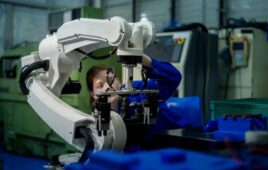Deana Fu
Director of Product Management
Electrical and Computer Engineering, Cornell University

Deana Fu has served as a product manager for various industrial automation products throughout her career. Her passion is in the intricate weave of engineering, business, and relationship-building. As the director of Product Management of Mitsubishi Electric Automation, Inc., she is responsible for the company’s product management team as they master their roles as innovators, problem solvers, and advocates for their product lines.
What first drew you to engineering?
Sending their children to college was everything that my parents had hoped for. When it finally came time for college applications, I stared at the blank field labeled intended major and drew a blank. I felt the conflicting emotions of almost living up to my parent’s expectations yet falling short for not having thought out what I was going to spend the next four years studying. I was raised to seek out new experiences, to step into discomfort, and to take calculated risks. So, I did exactly that, and off to Cornell University I went to pursue a degree in Electrical and Computer Engineering.
How has engineering helped you develop leadership skills?
I started in the world of manufacturing, first at Mitsubishi Electric’s factory in Japan and then at the American headquarters near Chicago. Transitioning to life and work in a different country helped me develop leadership skills that were foundational to my career in product management. When you are the least tenured of the team, you must persuade people to help you with your projects, listen and adjust to the team you are working with, and influence without authority over them. I also learned to give myself grace when I made mistakes and to be humble in accepting the advice and mentorship offered. When I first joined the team at our American headquarters, I received the assignment of launching a campaign to accelerate adoption of a new programmable controller product. I called the stakeholders to collect feedback and get their buy-in, and time and again I heard, “I get that this is the latest and greatest technology, but my customers do not care.” I planned a road trip around the country visiting customers to understand the challenges they were trying to resolve, advocated for enhanced features and functions with the development team, and crafted a new campaign to motivate our sales team to achieve the results I sought after.
Give us an example of your involvement in; a design project, a product launch, the development of a new technology, or the adoption of a new technology or process.
Recently, I was asked to lead the effort to implement a business operating system based on the 80/20 principle, which consists of driving a conscious decision to treat things with the appropriate amount of effort, based on the overall value they bring or could bring. Several cross-functional initiatives were implemented, and it became my role to coach each business group to define impactful strategies, be intentional at making data driven decisions (especially when it comes to resource allocations), and establish clear performance indicators to quantify progress. I had doubts about taking on this additional role of driving a cultural change within our organization. It seemed to be a distraction from my focus on building the best product management team I could. But after seeking out advice from my mentors, I realized nothing is in conflict at all. As a product leader, I not only have to understand the technical aspects of my product, but I also drive the growth strategy and own the business outcome.
Filed Under: Engineering Diversity & Inclusion




